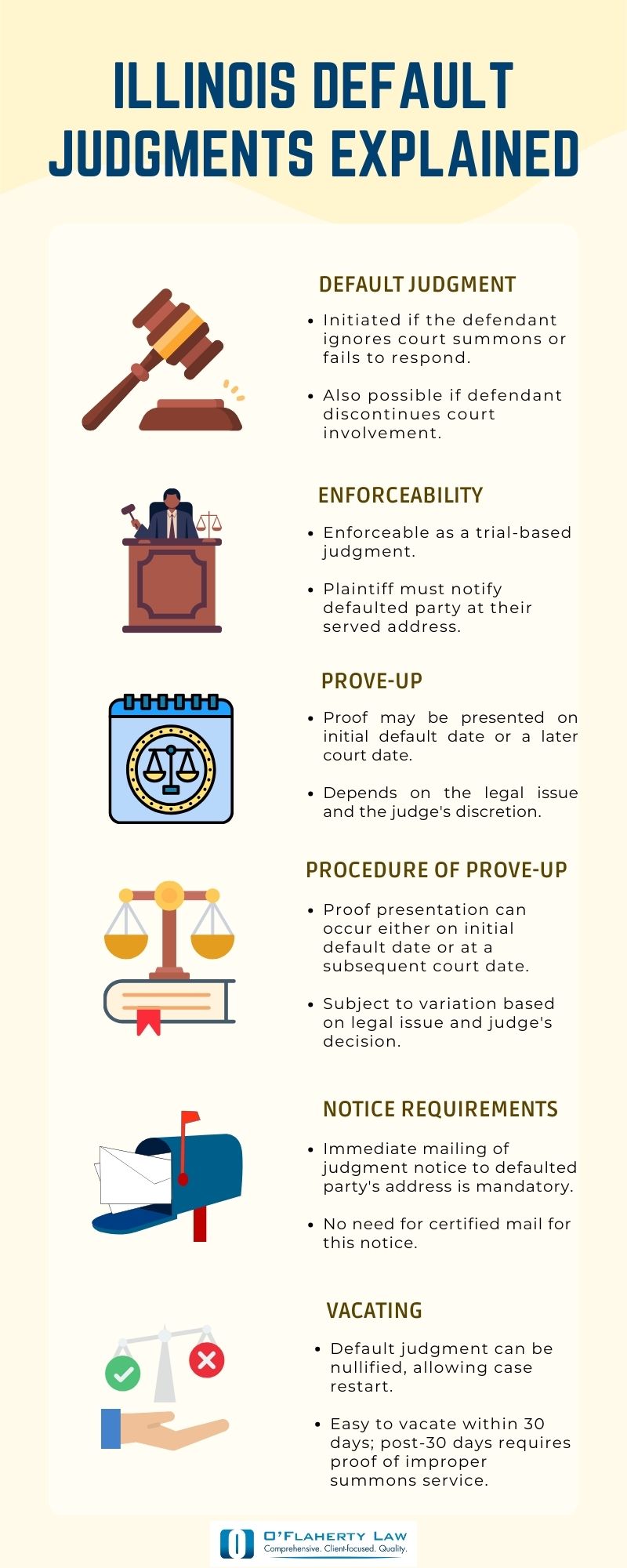
In this article, we will explain default judgments in Illinois. We will answer the questions: “what is a default judgment?” and “what is a prove-up for a default judgment?” We will also explain what notice of the default judgment is required and what it means to vacate a default judgment in Illinois.
What is a Default Judgment?
A default judgment occurs in Illinois civil cases when the defendant has been properly served with a complaint and summons and has failed to file an answer to the complaint by the first court date or to appear in court for the first court date. A default judgment can also occur later in the case if the defendant ceases to participate in required court dates or other court requirements.
A default judgment grants the relief sought in the plaintiff’s complaint against the defendant. It is enforceable, just like a judgment order entered after a trial. After a default judgment is entered, the plaintiff must send notice of the judgment to the party that has been defaulted.

What is a Prove-Up for a Default Judgment?
Even when the defendant fails to appear in court, the court may require that the plaintiff present proof of the allegations in the complaint before the default judgment is entered. The required form of proof varies based on the legal issue and the particular judge. In some situations, the only proof required is proof that the summons was properly served. This usually takes the form of a sheriff’s or special process server’s affidavit.
The plaintiff’s presentation of proof to the judge may occur at the same court date at which the initial default is ordered, or the default may be ordered, and a second court date may be set for prove-up.
Notice of Default Judgments in Illinois
Updated 6/28/19:
A reader asked the following question: Do I have to serve them again with this default to give them another chance to reply or just check the box they are not entitled to because they did not file or respond to the summons? If I do notify, should I serve by certified mail?
Answer: After entering a default order, you need to “immediately” mail notice of the default Judgment to the address at which the defaulted party was served. The notice need not be sent by certified mail.

Vacating a Default Judgment in Illinois
Although a default judgment is enforceable like a judgment entered after a trial, a default judgment may be vacated, unlike a judgment that is entered after a trial. When a default judgment is vacated, the judgment is essentially nullified, and the case proceeds from the point at which the default judgment occurred as if the default judgment had never been entered.
The defendant against whom the judgment was entered must file a motion to vacate the default judgment with the court to vacate a default judgment. Suppose this motion is filed within 30 days of the default judgment. In that case, the motion to vacate is almost always granted, regardless of why the defendant failed to appear in court.
Once 30 days have passed, it is much more difficult to vacate a default judgment. The defendant typically must show that he or she was not properly served with a summons by the plaintiff and therefore did not receive the required notice of the case. For this reason, when a plaintiff receives a default judgment, the plaintiff’s attorney will typically wait 30 days before initiating any enforcement actions.














.jpg)
